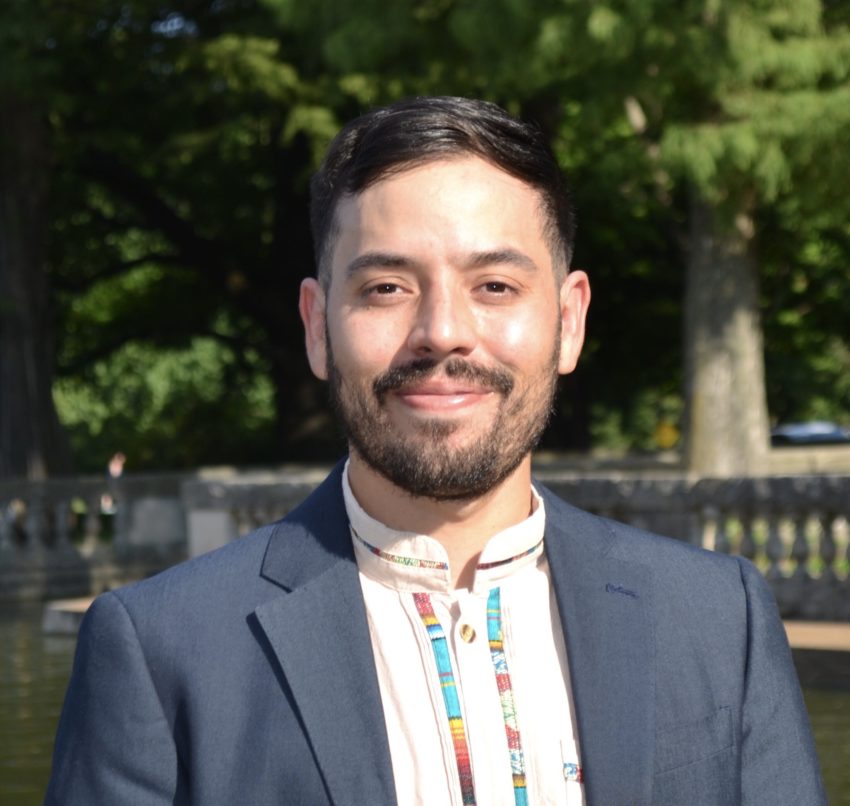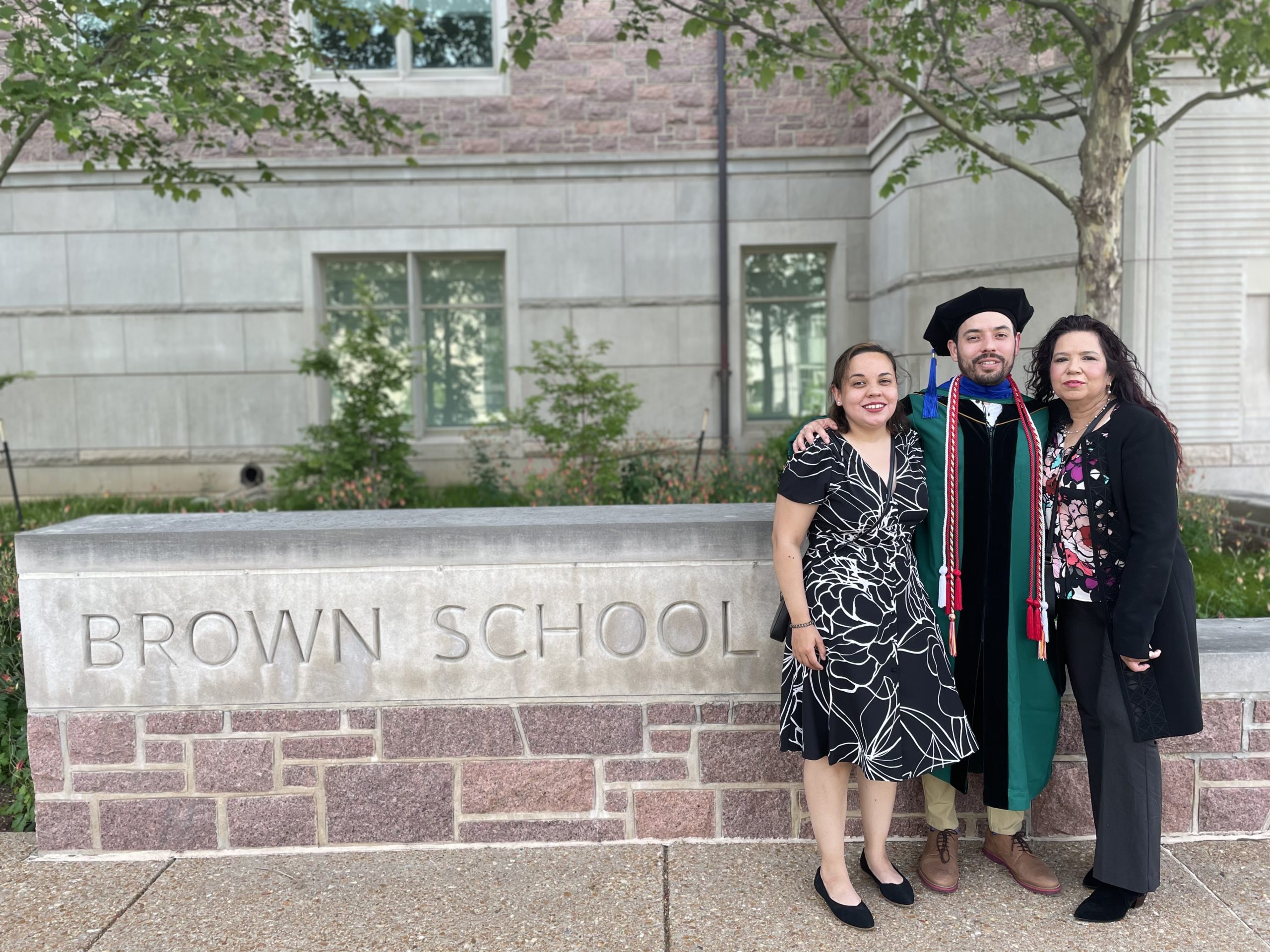
Share On Social!
Natalicio Serrano wasn’t sure he wanted to get a PhD.
He knew the journey would be difficult, especially as a Latino going into a field with little representation.
However, the Éxito! Latino Cancer Research Leadership Training at UT Health San Antonio changed that.
“For me, Éxito! painted a clearer picture of what I could do with a PhD. It gave me the energy to want to apply and continue on with this academic journey,” Serrano said.
Participating in Éxito! motivated Serrano to apply and get accepted to a PhD program in Public Health with the Prevention Research Center at Washington University in St. Louis.
Serrano is now a postdoctoral fellow in the Cancer Education and Career Development program at the University of Illinois at Chicago.
His research focuses on sustainable strategies for promoting physical activity, and how displacement and gentrification can affect them. As he conducts his postdoctoral work toward a small research award, he hopes to transition to a faculty position.
Helping Focus on the Academic Journey
“I wasn’t one of those students who knew they were going to get a PhD right off the bat,” Serrano said.
Serrano did his undergraduate and master’s studies at San Diego State University in their institute for Behavioral Community Health.
Hearing other Latino students talk about their experiences with Éxito! made Serrano interested.
Éxito!, led by Dr. Amelie G. Ramirez of the Institute for Health Promotion Research at UT Health San Antonio, recruits 25 master’s-level students and health professionals annually for a culturally tailored summer institute in San Antonio, Texas, optional internships, and ongoing education to promote pursuit of a doctoral degree and cancer research career.

“[San Diego State University] had a handful of students that did Éxito!, and a lot of them had good experiences, and it helped a lot of them with deciding their futures,” Serrano said.
He was also at a crossroads with his career.
“I was at a step where I was thinking about like, what am I going to do next after this MPH? Am I going to go into the workforce, be a public health practitioner, or keep on going with this academic journey?” Serrano said.
Serrano applied, was accepted, and attended Éxito! in 2015.
Meeting Other Latino Researchers
Serrano’s time at Éxito! helped him network with other Latinos.
“I remember it being a good experience, and I think a lot of that had to do with the people. We were around both the actual cohort of students that were part of the training program, but also the people they’re bringing in, and the leadership, including Dr. Ramirez,” Serrano said.
Being at Éxito! felt like a relief from the barriers he’s faced in pursuing his career as a Latino who didn’t come from an academic background.
“This is one of the first times I felt like I caught a break, or things became easier because of the people I was around and the genuine feeling of like, ‘Oh, these people want us to succeed,’” Serrano said.
Éxito! gave him the motivation to persevere and apply to doctoral programs.
The winter after he attended Éxito!, Serrano applied to PhD programs and was accepted to Washington University in St. Louis.
How Éxito! Helps with Lack of Latino Representation
Serrano is thankful for the mentors he’s had throughout his educational path who have helped him mitigate challenges.
“I’ve been lucky enough to have mentors who are themselves Latino. And at each state, I’ve been that were there I’ve been in my Masters, or my PhD program or the in betweens, the people that mentored me, were not that far off from where I was at that time. I’ve gotten great advice at all phases,” Serrano said.
It was impactful for him to be around so many Latinos in academia, particularly when the lack of representation is so apparent in most programs.

In fact, Latinos earn just 3.9% of all science and engineering doctoral degrees conferred, according to the National Science Foundation.
“The greatest challenge I’ve probably faced is the lack of representation of Latinos in academia. Even coming from what I saw as a diverse program at San Diego State, the lack of Latinos in higher education is obvious. And the higher up I go, the worse it gets. Everything always just seems so much harder at times being Latino or coming from a low SES background. Things in academia are just harder, I think,” Serrano said.
Pursuing a PhD is already difficult. But the added experience of being a person of color and facing bias and discrimination makes it even harder.
“Feeling like you belong in a room can be tough when you don’t look like anybody else, you don’t speak like anybody else. And I don’t think people realize how draining it can be, to do everything you have to do that comes with being a PhD student or being a part of a doctoral program, but also deal with microaggressions,” Serrano said.
Serrano credits his mentors for helping him through the difficult times.
“It can be lonely at times, but the mentorship I’ve had throughout has kind of pushed me through all of those challenges,” Serrano said.
His Advice for Latino Students
Serrano hopes that students interested in academia know the reasons why they want to do it so that they can stay focused on their goals.

“For any student thinking about academia, really sit down and brainstorm why you want to do a PhD program, if that’s the route you want to go in. Why, at the root of it, do you want to do it? Because if you don’t have good reasons, you’re just not going to get through the different phases you have to get through,” Serrano said.
He hopes Latino students will remember that there are many people out there who want them to succeed.
“Just keep on keeping on. It doesn’t always feel like it, but there are folks out there who are rooting for you and are genuinely invested in your success. It’s not an easy path. But if it is the one you want to take, it’s very possible for you,” Serrano said.
Having mentors along the way will also make the journey better, Serrano says.
“You need to find mentors, be they Latino or not, who really want to work with you and invest themselves in you. Because it will make your life so much easier and just make it more enjoyable as a whole,” Serrano said.
Learn More About Éxito!
Of 226 Éxito! trainees since 2011, over 25% have enrolled in or, like Serrano, graduated from a doctoral program.
Also, the Éxito! summer institute significantly increased trainees’ confidence to apply to a doctoral program and academic self-efficacy, according to a 2019 study of Éxito! program results published in the Journal of Cancer Education. The study also found significant increased research skills among Éxito! interns.
In 2018, Éxito! was named an innovative “Program to Watch” in a report by Excelencia in Education, a national group that promotes Latinos in higher education. The group also includes Éxito! as part of its “Growing What Works Database.”
Excelencia also selected Éxito! as a finalist for its “Examples of Excelencia” award in 2018, 2019, and 2021.
Go to www.exitotraining.org for more information.
How Can I Advocate for Latinos in Healthcare?
You can make a difference by advocating for health equity in your own community.
Select your county name and get a customized Health Equity Report Card from Salud America! at UT Health San Antonio, which shows your area stacks up in housing, transit, poverty, health care, food, and other health equity issues compared to your state and nation.
The Health Equity Report Card auto-generates local data with interactive maps and comparative gauges, which can help you visualize and explore health inequities.
Latinos in healthcare like Serrano may also face barriers and bias when working in the industry.
Did you know that doctors have implicit, subconscious preferences for white patients over those of color?
This is implicit bias.
These biases — stereotypes that affect our understanding and decisions about others beyond our conscious control — lead to discrimination and health disparities.
Fortunately, implicit bias can be “rewired” for compassion for patients of color.
Download the free Salud America! Action Pack “Health Care Workers and Researchers: Find If You Have Implicit Bias and What to Do Next.”
By The Numbers
3
Big Excuses
people use to justify discriminatory behavior
This success story was produced by Salud America! with support from the Robert Wood Johnson Foundation.
The stories are intended for educational and informative purposes. References to specific policymakers, individuals, schools, policies, or companies have been included solely to advance these purposes and do not constitute an endorsement, sponsorship, or recommendation. Stories are based on and told by real community members and are the opinions and views of the individuals whose stories are told. Organization and activities described were not supported by Salud America! or the Robert Wood Johnson Foundation and do not necessarily represent the views of Salud America! or the Robert Wood Johnson Foundation.



